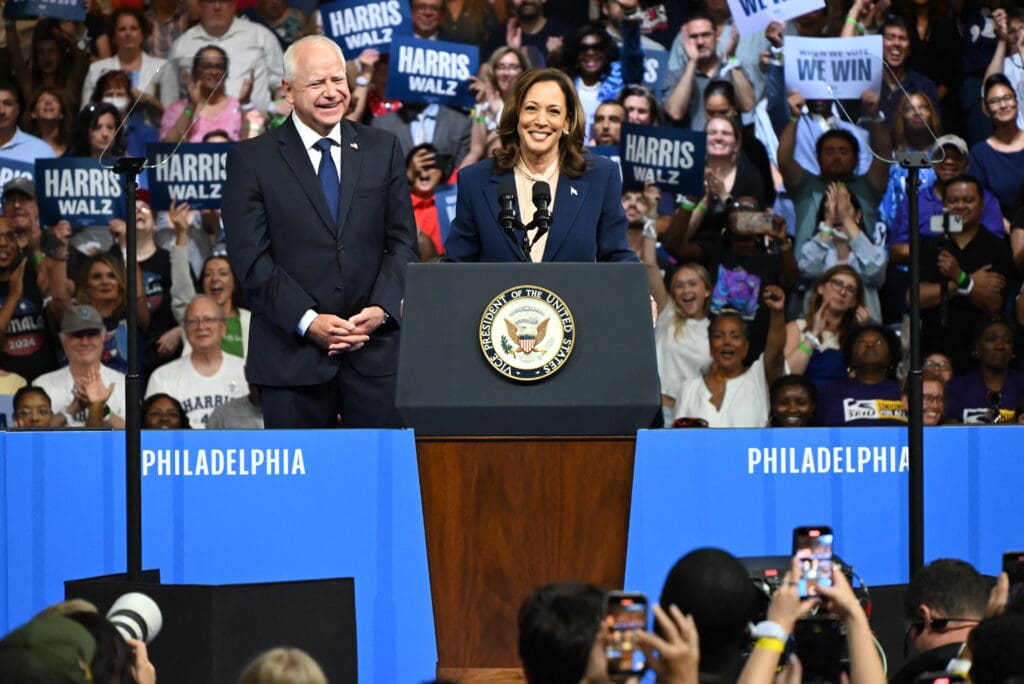One of the great ironies of American politics is that despite the country’s immense power and influence in the world, U.S. foreign policy and international affairs hardly factor into the calculus of most American voters. The 2024 presidential race may be different, however.
Since October 7, 2023, the Hamas-led attack on Israel, and Israel’s catastrophic war on Gaza, Middle East politics has played an uncharacteristically large role in the race for the presidency. For several months, President Joe Biden’s unwavering support for Israel, as it prosecuted a military offensive that has been credibly characterized as genocide, dogged him at home, particularly within his own party. Clutching to an anachronistic worldview that holds support for Israel as sacrosanct, Biden found himself out of step with the grassroots and progressive wing of his party, especially among young and minority voters, as anger over Israeli atrocities in Gaza mounted.
While Biden eventually stepped out of the race, ostensibly due to insurmountable concerns over his age and deteriorating mental capacity, it is impossible to ignore the effect that Gaza had on his popularity and support—especially in key swing states where Arab Americans are well represented and that were crucial to Biden’s chances in November. Indeed, in a May poll conducted among Arab Americans, only 7% said they planned on voting for Biden. If that number had carried over into the election, it would have been very difficult for Biden to win.
When Vice President Kamala Harris quickly stepped into the fray and secured her party’s backing, she immediately tried to strike a different tone on Gaza. In her first address she said, “we cannot look away in the face of these tragedies [in Gaza]. We cannot allow ourselves to become numb to the suffering, and I will not be silent.” Although this was markedly different than the president, who had failed utterly over 10 months to show empathy with Palestinians, Harris also affirmed her “unwavering commitment” to Israel and its right to self-defense, leaving questions on the table for the pro-Palestinian movement.
A more important indication came with her pick for running mate. During a rushed process, three candidates were shortlisted: Arizona Senator Mark Kelly, Pennsylvania Governor Josh Shapiro and Minnesota Governor Tim Walz. As the contest quickly narrowed around Shapiro and Walz, the situation in Gaza surfaced again as arguably the deciding factor.
Despite being visibly younger than Walz—in an election where age is important—and a popular governor in a critical swing state, Shapiro’s record on Israel quickly became a point of contention, with critics lambasting his long history of staunch support for Israel. In fact, as a young man Shapiro served as a volunteer in the Israel Defense Forces (IDF) and made incendiary comments about Palestinians while a college student. As the attorney general of Pennsylvania, he also targeted the ice cream company Ben & Jerry’s with anti-boycott legislation for refusing to sell its product in illegal Israeli settlements. As governor, he accused some college students protesting the genocide in Gaza of anti-Semitism and compared them to members of the Ku Klux Klan, a white supremacist movement, using free speech laws to voice hate speech. Shapiro also supported a bill in Pennsylvania that would punish colleges that boycott or divest from Israel.
Walz, for his part, has held typical establishment views on Israel-Palestine within the Democratic Party. Yet since October 7, he has been much more even-handed than Shapiro, both expressing empathy for Palestinians in Gaza and being conciliatory toward critics of U.S. support for Israel within the party and on college campuses. This was enough for many progressives and pro-Palestinian voters to rally around Walz over Shapiro.
While many observers considered Shapiro the front-runner, his candidacy hinged on his pro-Israel stance, with supporters and detractors making it the main point of contention. Indeed, supporters of Israel waged a fierce lobbying campaign, both privately and publicly, for Shapiro as their candidate, even accusing critics of anti-Semitism. This made the outcome doubly important in terms of symbolism and narrative. If Shapiro was passed over, it would signal that the party’s position on Israel was changing and perhaps that the next Democratic administration would feel less concerned with placating the pro-Israel lobby.
Ultimately, Harris tapped Walz. While it is impossible from the outside to know the Harris team’s precise reasoning, it appears from this vantage point that the Gaza issue was pivotal, which says a lot about the emerging influence of the pro-Palestinian movement within Democratic Party politics. Perhaps for the first time at the national level, being too pro-Israel was seen as a liability.
The General Election
With no end in sight to Israel’s war on Gaza, and the regional landscape heating up, the crisis in the Middle East is likely to continue to play a role in the battle between Harris and Former President Donald Trump.
Certainly, Trump does not face the same cleavages on the issue within his own party. However, there are emerging and influential voices on the right, including people like Tucker Carlson, who now question reflexive U.S. support for Israel under the banner of “America First” patriotism. Trump has also dispatched his former director of national intelligence, Richard Grenell, to try to bring Arab Americans in key swing states like Michigan into his camp.
Yet it will likely be the battle between the two competing party tickets where Gaza and support for Israel will play out most fully. Harris, in particular, will have to find the right balance that avoids alienating one or both sides of her party that are vehemently opposed to each other on this issue, while fending off attacks from the Republican side.
Threading this needle will not be easy. Harris is the vice president of the man that many hold responsible for enabling the ongoing genocide in Gaza. To earn their trust, and their vote, they are demanding that she openly declare her intention to bring an end to U.S. complicity. This was exemplified at a recent rally in Michigan where protesters interrupted her speech with the chant, “Kamala, Kamala, you can’t hide, we won’t vote for genocide.” The message was clear: statements of empathy won’t be enough to bring them to the polls for her in November. They want action, or at least a declaration of intent.
Harris’ response was telling. She scolded the protesters and insinuated that such statements would bring about Trump’s victory. The comment reflected how little members of the Democratic establishment understand the protest movement. With tens of thousands dead in Gaza, and thousands more likely to lose their lives between now and November, the urgency and moral imperative eclipse the politics of the moment and many will not settle for the lesser of two evils when the “lesser” side is facilitating genocide.
Still, Harris likely cannot win if she also alienates the pro-Israel voters and donors who hold considerable influence within the party establishment and are the bedrock of its finances.
It is unclear if she can find the right formula to win over both. But if she succeeds, the process could produce a new Democratic narrative and policy on Israel-Palestine to guide the party and the country for the next four years and possibly beyond.


